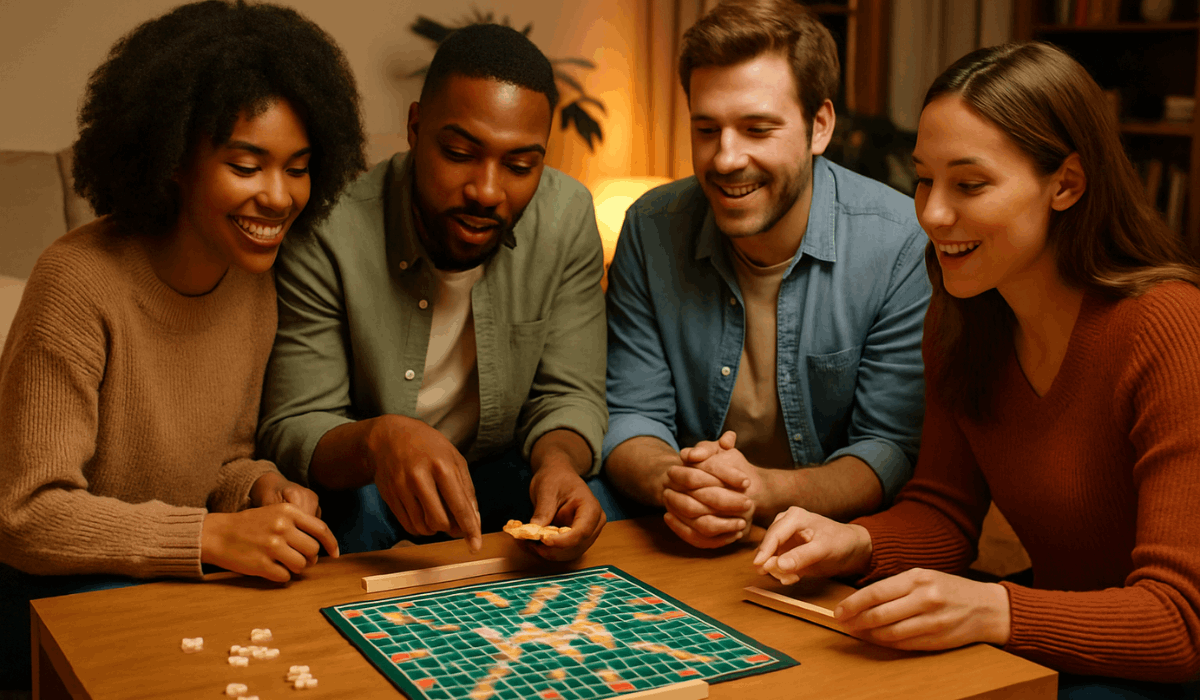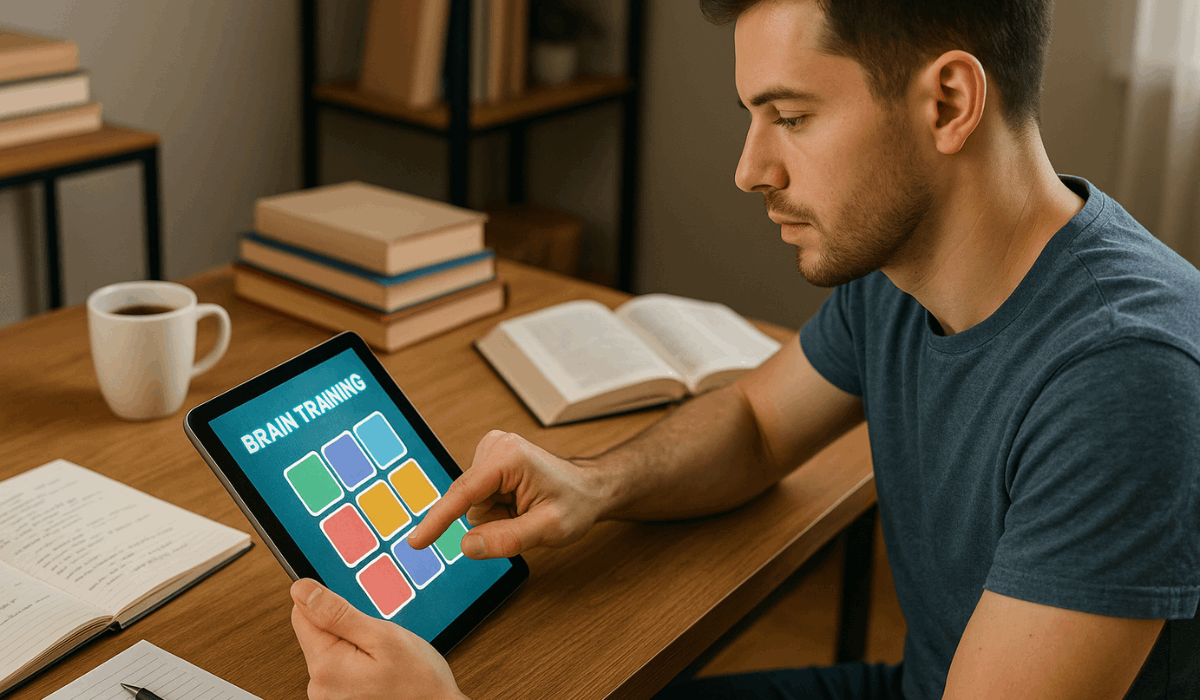Games aren’t just for entertainment—they can be powerful tools to improve how you think.
By playing the right types of games, you can boost memory, sharpen focus, and develop problem-solving skills.
This guide shows you how to use games to stimulate your mind and increase intelligence.
The Science Behind Gaming and Brain Function
Studies show that playing games can improve brain functions like memory, attention, and decision-making.
Games stimulate areas of the brain responsible for learning and problem-solving through repetition and challenge.
Regular gameplay encourages neuroplasticity, helping your brain form new connections and stay mentally sharp.
Best Game Types to Improve Mental Abilities
Different games target different parts of your brain, helping you improve specific mental skills.
To get the most out of gaming, focus on titles that challenge your thinking, memory, language, or speed.
Here are the best types of games to stimulate your mind:
- Puzzle and Logic Games – Strengthen problem-solving and pattern recognition (e.g., Sudoku, chess, nonograms).
- Memory-Boosting Games – Improve short-term and working memory (e.g., Lumosity, Memory Match, Simon).
- Strategy and Planning Games – Train decision-making and long-term planning (e.g., Civilization, StarCraft, XCOM).
- Language and Word Games – Build vocabulary and verbal fluency (e.g., Scrabble, Wordle, crosswords).
- Speed and Reaction Games – Sharpen reflexes and attention span (e.g., Tetris, rhythm games, racing games).
- Brain Training Apps – Offer daily challenges across various skills (e.g., Elevate, Peak, CogniFit).
- Social and Team-Based Games – Improve teamwork, flexibility, and quick thinking (e.g., co-op board games, online strategy games).
Brain Training Apps and Platforms
Brain training apps offer quick, focused exercises designed to improve your mental sharpness.
These platforms adjust to your skill level and help track your progress over time. Here are some top options you can try:
- Lumosity – Offers games that target memory, attention, and problem-solving with daily challenges.
- Elevate – Focuses on reading, writing, math, and speaking skills through short, personalized sessions.
- Peak – Combines fun visuals with cognitive games for focus, emotion control, and agility.
- CogniFit – Provides in-depth mental assessments and training programs tailored to your needs.
- NeuroNation – Delivers science-backed brain workouts with stats to show your development.

Digital vs. Physical Games – What Works Better?
Both digital and physical games can improve your brain, but they offer different benefits.
Choosing the right format depends on your goals, preferences, and daily routine. Here’s a quick comparison to help you decide:
- Digital Games – Often faster-paced and suitable for training memory, reflexes, and multitasking.
- Physical Board Games – Encourage face-to-face interaction and help with strategy, patience, and verbal skills.
- Digital Apps – Easy to access on your phone and ideal for short, daily brain workouts.
- Card and Tabletop Games – Great for social connection and logical thinking in a slower, focused setting.
- Video Games – Can develop spatial reasoning, reaction time, and problem-solving in immersive environments.
- Group Board Games – Boost teamwork, planning, and real-time decision-making with others.
Social and Multiplayer Games for Mental Engagement
Playing with others adds a social element that can make mental training more dynamic and effective.
Social and multiplayer games challenge your brain in real-time and improve your ability to adapt, cooperate, and think quickly.
Here are the key benefits of these games:
- Enhance Communication – Talking with teammates sharpens your verbal and listening skills.
- Improve Decision-Making – Fast-paced interactions require quick and thoughtful choices.
- Build Emotional Control – Managing wins and losses with others teaches patience and self-regulation.
- Boost Problem-Solving – Group challenges force you to analyze situations and find solutions under pressure.
- Increase Adaptability – You learn to shift strategies as teammates or opponents change tactics.
- Strengthen Social Bonds – Regular play with others can reduce stress and support mental well-being.
How to Incorporate Brain Games into Your Routine
Adding brain games to your routine doesn’t have to be complicated.
With a few small changes, you can turn daily moments into opportunities for mental training. Here are simple ways to get started:
- Set a Daily or Weekly Goal – Aim for 15–30 minutes of play to keep it consistent and manageable.
- Use Break Times – Play short games during lunch, coffee breaks, or before bed.
- Try a Variety of Games – Mix puzzle, memory, and reaction games to work different skills.
- Use Apps with Reminders – Let mobile platforms prompt you to stay on track.
- Play With Family or Friends – Turn game night into brain training for everyone.
- Track Your Progress – Use in-app stats or a notebook to see your improvement over time.

Mistakes to Avoid When Using Games for Intelligence
Using games to boost intelligence works best when done with intention. Some habits can limit your progress or even waste your time.
Here are common mistakes to avoid:
- Only Playing One Type of Game – Sticking to a single genre won’t challenge all areas of your brain.
- Choosing Mindless or Repetitive Games – Games with no problem-solving or thinking offer little benefit.
- Playing Too Long Without Breaks – Overplaying can lead to fatigue and reduced focus.
- Ignoring Real-Life Interaction – Balance solo play with social games for better cognitive impact.
- Skipping Progress Tracking – Without goals or feedback, it’s hard to know if you’re improving.
- Using Games to Avoid Responsibilities – Games should support growth, not be used as distractions.
How Age Affects Brain Training with Games
Your age plays a role in how your brain responds to different types of games. Children, adults, and seniors benefit from brain training in unique ways.
Here’s how age can influence the effectiveness of cognitive games:
- Children – Learn faster and absorb new information easily; best with games that teach logic, math, or language.
- Teens – Improve focus, decision-making, and critical thinking with competitive or strategy-based games.
- Young Adults – Benefit from games that sharpen memory, multitasking, and emotional control.
- Middle-Aged Adults – Can slow cognitive decline and boost adaptability through puzzle and planning games.
- Seniors – Strengthen memory, reaction time, and mental alertness with simple yet challenging games.
- All Ages – Gain more when the game difficulty matches their current mental ability and grows over time.
How to Measure Cognitive Improvement Over Time
Tracking your progress helps you see if your brain training efforts are working.
Measuring improvement doesn’t require complex tools—just a few consistent habits. Here are simple ways to monitor your cognitive gains:
- Use App-Based Stats – Most brain training apps track your scores and show progress over time.
- Keep a Personal Journal – Write down how long you play, what games you use, and how you feel after.
- Note Real-Life Changes – Pay attention to better focus, faster thinking, or improved memory in daily tasks.
- Set Benchmarks – Test yourself monthly on tasks like memorizing lists or solving puzzles faster.
- Compare Game Scores – Revisit older games and check if you’re completing them more quickly or with better accuracy.
- Ask for Feedback – Friends or coworkers might notice changes in how you process and respond to situations.
The Bottomline
Using games to boost your mind is simple, effective, and can fit into any routine.
By choosing the right types of games and tracking your progress, you’ll strengthen memory, focus, and problem-solving skills over time.
Start today by picking one game that challenges your brain and make it part of your daily habit.



